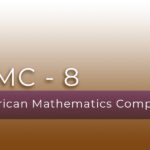AIME – 1983 Problems
Problem 1
Let $x$, $y$ and $z$ all exceed $1$ and let $w$ be a positive number such that $\log_xw=24$, $\log_y w = 40$ and $\log_{xyz}w=12$. Find $\log_zw$.
Problem 2
Let $f(x)=|x-p|+|x-15|+|x-p-15|$, where $0 < p < 15$. Determine the minimum value taken by $f(x)$ for $x$ in the interval $p \leq x\leq15$.
Problem 3
What is the product of the real roots of the equation $x^2 + 18x + 30 = 2 \sqrt{x^2 + 18x + 45}$?
Problem 4
A machine-shop cutting tool has the shape of a notched circle, as shown. The radius of the circle is $\sqrt{50}$ cm, the length of $AB$ is $6$ cm and that of $BC$ is $2$ cm. The angle $ABC$ is a right angle. Find the square of the distance (in centimeters) from $B$ to the center of the circle.
Problem 5
Suppose that the sum of the squares of two complex numbers $x$ and $y$ is $7$ and the sum of the cubes is $10$. What is the largest real value that $x + y$ can have?
Problem 6
Let $a_n=6^{n}+8^{n}$. Determine the remainder on dividing $a_{83}$ by $49$.
Problem 7
Twenty five of King Arthur’s knights are seated at their customary round table. Three of them are chosen – all choices being equally likely – and are sent off to slay a troublesome dragon. Let $P$ be the probability that at least two of the three had been sitting next to each other. If $P$ is written as a fraction in lowest terms, what is the sum of the numerator and denominator?
Problem 8
What is the largest $2$-digit prime factor of the integer $n = {200\choose 100}$?
Problem 9
Find the minimum value of $\frac{9x^2\sin^2 x + 4}{x\sin x}$ for $0 < x < \pi$.
Problem 10
The numbers $1447$, $1005$ and $1231$ have something in common: each is a $4$-digit number beginning with $1$ that has exactly two identical digits. How many such numbers are there?
Problem 11
The solid shown has a square base of side length $s$. The upper edge is parallel to the base and has length $2s$. All other edges have length $s$. Given that $s=6\sqrt{2}$, what is the volume of the solid?

Problem 12
Let $m\ge 2$ be an integer, $A$ a finite set of integers (not necessarily positive) and $B_1,B_2,…,B_m$ subsets of $A$. Suppose that, for every $k=1,2,…,m$, the sum of the elements of $B_k$ is $m^k$. Prove that $A$ contains at least $\dfrac{m}{2}$ elements.

Problem 13
Let $m\ge 2$ be an integer, $A$ a finite set of integers (not necessarily positive) and $B_1,B_2,…,B_m$ subsets of $A$. Suppose that, for every $k=1,2,…,m$, the sum of the elements of $B_k$ is $m^k$. Prove that $A$ contains at least $\dfrac{m}{2}$ elements.
Problem 14
Let $m\ge 2$ be an integer, $A$ a finite set of integers (not necessarily positive) and $B_1,B_2,…,B_m$ subsets of $A$. Suppose that, for every $k=1,2,…,m$, the sum of the elements of $B_k$ is $m^k$. Prove that $A$ contains at least $\dfrac{m}{2}$ elements.

Problem 15
Let $m\ge 2$ be an integer, $A$ a finite set of integers (not necessarily positive) and $B_1,B_2,…,B_m$ subsets of $A$. Suppose that, for every $k=1,2,…,m$, the sum of the elements of $B_k$ is $m^k$. Prove that $A$ contains at least $\dfrac{m}{2}$ elements.






